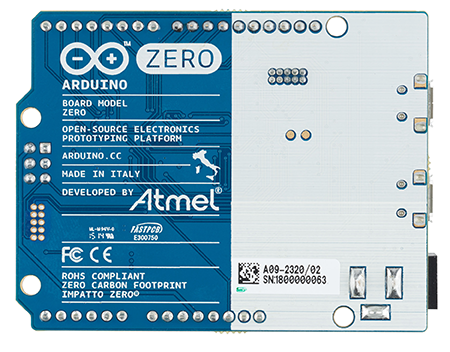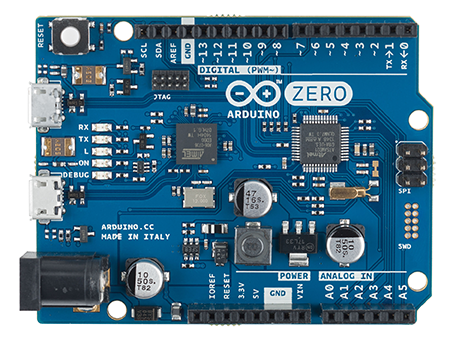Arduino is an open-source electronics prototyping platform based on flexible, easy-to-use hardware and software. It’s intended for artists, designers, hobbyists and anyone interested in creating interactive objects or environments.
Arduino can sense the environment by receiving input from a variety of sensors and can affect its surroundings by controlling lights, motors, and other actuators. The microcontroller on the board is programmed using the Arduino programming language (based on Wiring) and the Arduino development environment (based on Processing). Arduino projects can be stand-alone or they can communicate with software running on a computer (e.g. Flash, Processing, MaxMSP).
The Arduino Zero is a simple and powerful 32-bit extension of the platform established by Arduino UNO. The Zero board aims to provide creative individuals with the potential to realize truly innovative ideas for smart IoT devices, wearable technology, high-tech automation, crazy robotics, and projects not yet imagined. The board is powered by Atmel’s SAMD21 MCU, which features a 32-bit ARM Cortex® M0+ core.
The Zero board expands the Arduino family by providing increased performance to fuel the creativity of the maker community. The flexible feature set enables endless project opportunities for devices and acts as a great educational tool for learning about 32-bit application development. One of its most important feature is Atmel’s Embedded Debugger (EDBG), which provides a full debug interface without the need for additional hardware, significantly increasing the ease-of-use for software debugging. EDBG also supports a virtual COM port that can be used for device programming and traditional Arduino boot loader functionality.
Summary
- Microcontroller ATSAMD21G18, 48pins LQFP
- Operating Voltage 3.3V
- Digital I/O Pins 14, with 12 PWM and UART
- Analog Input Pins 6, including 5 12bits ADC channels and one 10 bits DAC
- DC Current per I/O Pin 7 mA
- Flash Memory 256 KB
- SRAM 32 KB
- EEPROM up to 16KB by emulation
- Clock Speed 48 MHz


